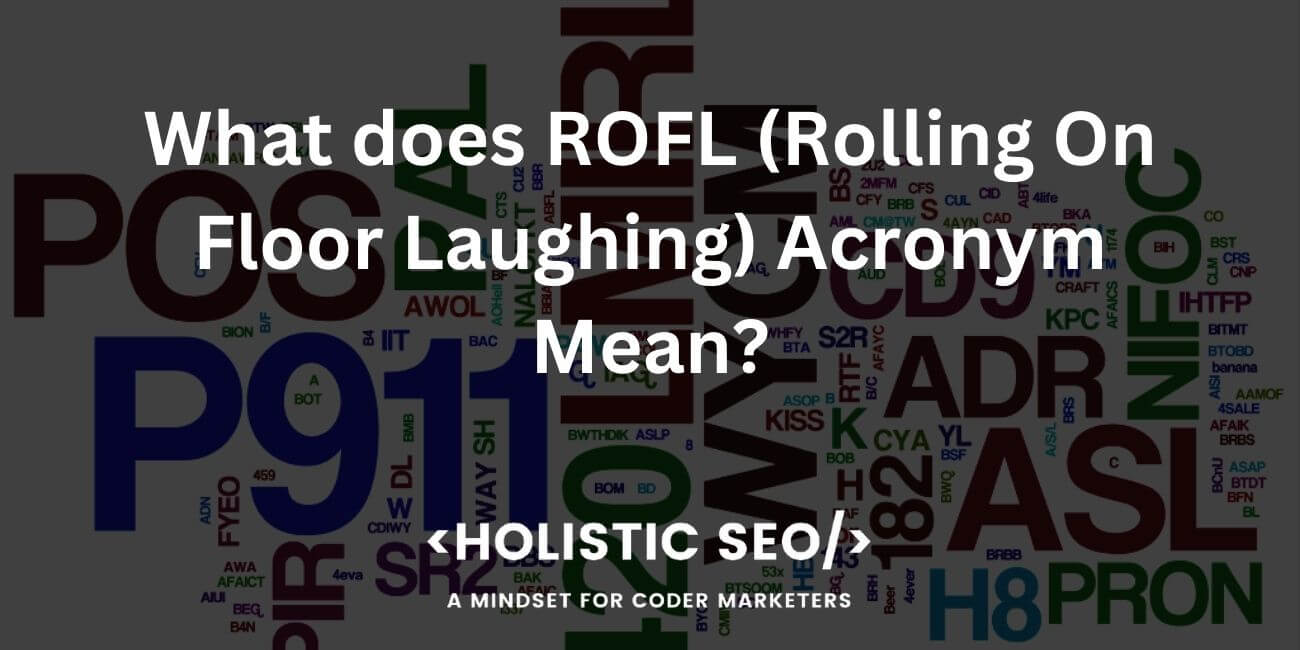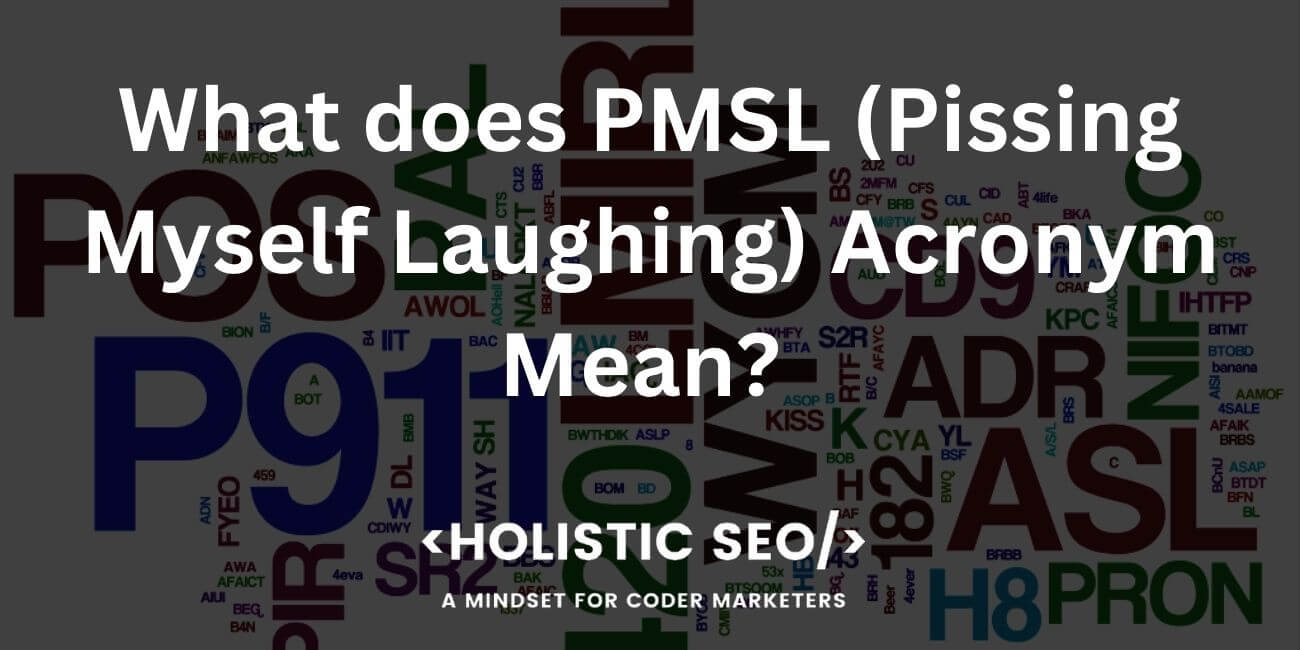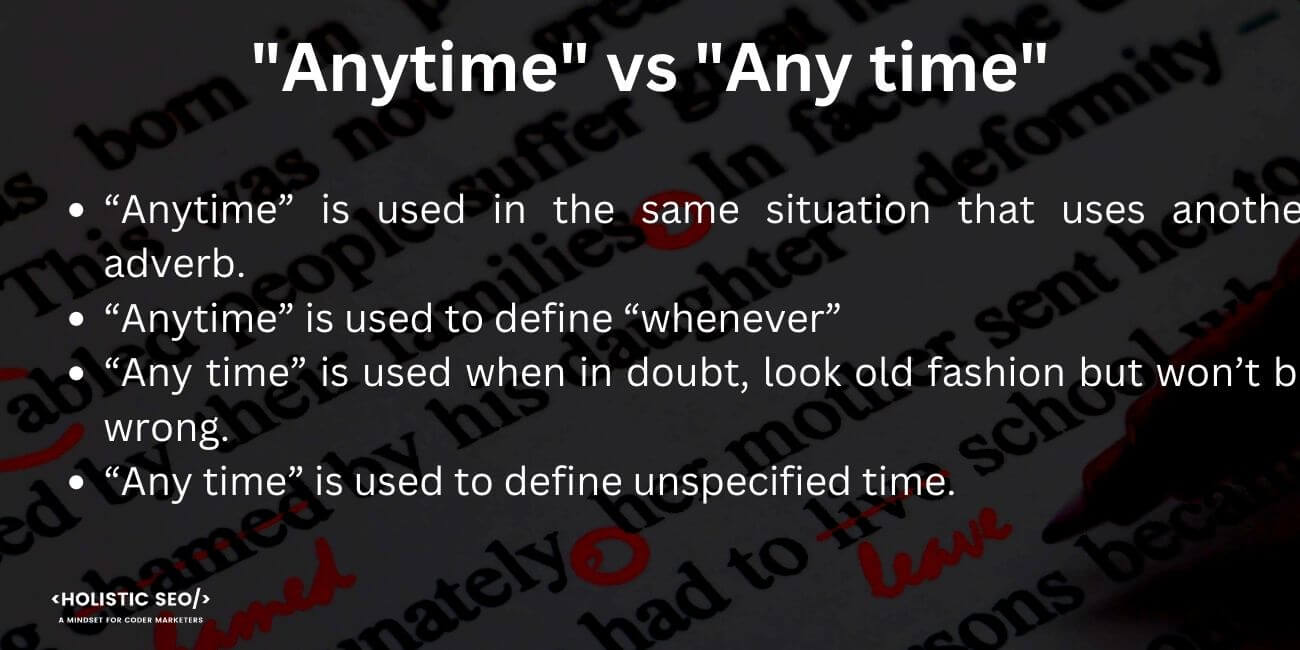Nowadays, various abbreviations are used by younger users online. One of these is ROFL. What does the text ROFL mean? The ROFL acronym stands for “Rolling On Floor Laughing.” ROFL is an internet meme born in the 1980s. The ROFL word is an Internet slang and meme that indicates someone found something funny. Internet slang refers to the unofficial and unconventional language used by internet users to interact with one another. Internet language includes all these abbreviations that most younger users use. Some of which are LOL, ROFL, and LMAO. On the other hand, the standardized definition of internet slang is challenging to come up with because internet slang is continually evolving. An Internet meme is defined as a practice, idea, phrase, or piece of media that becomes well-liked and spreads quickly online. Social networking websites and blogs that post and repost popular memes propel an internet meme along by reinforcing the meme’s popularity. ROFL is brought to the next level by associating someone laughing, rotating like a helicopter with the internet meme, ROFLCOPTER. Moreover, ROFL is quite similar to LOL. The words indicate that something is funny. However, ROFL and LOL have a difference. ROFL is when someone finds something extremely funny. It is an exaggerated term for LOL, mainly because LOL is when someone finds something funny but not as much. ROFL and LOL are informal terms and must only be used in casual conversation. Not many people know what these abbreviations stand for, especially the older ones. There is a tendency for them not to understand it if abbreviations such as ROFL are used. Nonetheless, ROFL is allowed to be used in content writing as long as the keyword is relevant to the topic. Otherwise, ROFL must be omitted to maintain professionalism and be understood by most online readers.
Who found ROFL Abbreviation?
The first known use of the term ROFL was in an internet conversation on Uneset, according to Own3d. Usenet, or User’s Network, is one of the oldest forums on the internet. Usenet was greeted by two students, Tom Truscott and Jim Ellis, in 1979. Usenet allows users to create forums online wherein they are allowed to share ideas and opinions about certain issues. ROFL was first used by someone named Chuq through Usenet in 1989 when he found another user funny because the user does not know the term Read the Fucking Manual (RTFM).
Do People Use ROFL for face-to-face Communication?
No, people do not use ROFL for face-to-face communication. Face-to-face communication involves two or more people interacting. It is the most common type of communication wherein people are exchanging information verbally through mouths and voices. ROFL is an abbreviation, and it is read and pronounced letter per letter and not as a whole word. It is not pronounced as ROFL, but rather R-O-F-L. Expressing feelings using an abbreviation is very hard and inconvenient during face-to-face communication, especially if the abbreviation refers to an action like ROFL. ROFL means Rolling On Floor Laughing, and it describes an action. One just does the action to be understood further during face-to-face communication instead of saying “ROFL” itself.
Is ROFL only for textual communication?
Yes, ROFL is only for textual communication. Textual communication is the type that is read and viewed. It is the most active communication activity used in online communication and literary texts. ROFL refers to the action of Rolling On the Floor Laughing. The abbreviation is useful for textual communication for readers to further understand the writer’s feelings. ROFL abbreviation provides a faster and more effective way of expressing a burst of laughter. The abbreviation ROFL is more suitable for textual communication than face-to-face one, especially when someone wants to shorten the text. Abbreviations are used in textual communication by people that do not want to spend more time typing or writing when they find something funny. Typing the whole phrase “Rolling On Floor Laughing” is time-consuming instead to typing the abbreviation, ROFL, of the expression. People rather type the abbreviation to indicate something is funny because it is more convenient and efficient.
Is ROFL a Pragmatic Particle?
Yes, ROFL is not a Pragmatic Particle. ROFL has been accepted by various dictionaries, such as Oxford English Dictionary because people constantly use it. Pragmatic particles are known as discourse particles. Discourse particles are used to introduce a new topic or go back to the earlier topic. It helps structure the communication process and embed utterances into the communicative context. The basic idea of the particle is to add context to the sentence, expressing a mood or indicating a specific action. However, it has an intrinsic meaning and fits into other grammatical categories.
When did the Oxford English Dictionary accept the ROFL Abbreviation?
Oxford English Dictionary (OED) accepted the ROFL abbreviation in June 2016. OED is considered an acknowledged expert in the English language. It is very different from other English dictionaries mainly because OED focuses on present-day meanings of the words. The history of individual words and the language is found. Oxford English Dictionary (OED) releases updates about new words added to the dictionary each month per year. Based on the OED June 2016 update, more than a thousand words were added along with ROFL. Oxford English Dictionary defines ROFL as “roll or rolling on the floor laughing.” It is used to express that the speaker or writer found something funny.
Is the oldest use of ROFL on Usenet from the 1980s?
Yes, the oldest use of ROFL on Usenet was from the 1980s. The first known use of ROFL on the internet was during a conversation on Usenet in 1989. USENET is a worldwide system established in 1979 for Internet forums with a set of newsgroups organized by subject. Users are allowed to share their ideas and opinions with the newsgroups. Forums are broadcast to other computer systems through the Internet.
What are the Variations of ROFL?
Listed below are the variations of ROFL.
- ROFLMAO: ROFLMAO stands for “Rolling On the Floor Laughing My Ass Off.” Like ROFLOL, ROFLMAO is used in electric communication and has become part of modern English vernacular to signify great amusement. ROFLMAO is often used in lowercase to indicate something is hilarious or ridiculous.
- ROFLOL: ROFLOL is a predecessor of ROFLCOPTER. The acronym ROFLOL indicates amusement and stands for “Rolling On Floor, Laughing Out Loud.” LOL (Laughing Out Loud) is still frequently used to express amusement and acceptance, but the acronym’s meaning has been diminished due to overuse. ROFLOL and the rest of the famous internet slang, including LOL, LUL, are likely to be used ironically. Acronyms such as ROFLOL have developed to convey sincere amusement as a result.
- ROFLMAOAY: ROFLMAOAY is another variant of ROFLCOPTER. ROFLMAOAY is an acronym for “Rolling On Floor Laughing My Ass Off At You.” The acronym is similar to ROFLCOPTER, indicating that something is ridiculous. ROFLMAOAY is used in textual communication to express extreme laughter over something.
- ROFLMAOWTIME: ROFLMAOWTIME means “Rolling On the Floor Laughing My Ass Off With Tears In My Eyes.” ROFLMAOWTIME is an escalation of ROFLCOPTER. The acronym ROFLMAOWTIME is used to denote something hilarious to the point that someone is laughing badly, which causes tears in the eyes. The acronym involved hyperbole, indicating superlatives or hilarious.
- ROFLMAOASTC: ROFLMAOASTC is another variant of ROFLCOPTER. ROFLMAOASTC is an acronym for “Rolling On the Floor Laughing My Ass Off and Scaring The Cat. The abbreviation is an intensification of ROFLCOPTER. The abbreviation is used to express that something is extremely laughable.
What are the Derivations of ROFL?
Listed below are the Derivations of ROFL.
- ROFLCOPTER: ROFLCOPTER stands for “Rolling On Floor Laughing, Rotating Like a Helicopter.” ROFLCOPTER is an internet meme born in the early 2000s. The meme ROFLCOPTER depicts a helicopter with the typographical character of ROFL and LOL as the propellers.
- ROFLSTOMP: ROFLSTOMP stands for “Rolling On Floor Laughing + stomp.” Gamers use ROFLSTOMP to indicate that they defeat an opponent easily and decisively or to trounce. “Trounce” is defined by the Oxford English Dictionary as “to defeat someone completely.”
Listed below are the terms related to ROFL.
- LOL: LOL is an acronym for laugh out loud. It is used as an interjection and a verb. LOL is one of the most common slang terms in electronic communications. Even though LOL means to laugh out loud, lol is mainly used to indicate smiling or slight amusement.
- LUL: LUL is an acronym for “Lame Uncomfortable Laugh.” The word expresses an uncomfortable laugh whenever there is an awkward situation or someone has heard an unpleasant and lousy joke. Another meaning of LUL is “Love You Lots,” a form of endearment.
- LQTM: Laughing Quietly To Myself: A kinder, Gentler, more accurate “LOL.” First credits for using LQTM date back to George W. Braun in 1999. LQTM is an abbreviation for “Laughing Quietly To Myself.” It is considered chat slang and is often used when chatting with other people. People often use shorthand, or abbreviations, to send messages quicker with less typing in chat programs and text messages. The word LQTM is one of many abbreviations used in chats and texts.
- LMAO: LMAO is an acronym for “Laughing My Ass Off,” which means having an intense laugh. LMAO is a more powerful version of LOL, expressing a more extreme and louder laugh. It is used to respond to funny messages, jokes, or entertaining content usually found on the internet.
- LMHO: LMHO is an acronym for “laughing my head off,” which is a variation of the popular LMAO acronym. LMHO is typically used after reading, seeing, or hearing something so funny that the head seems to be falling off from laughing so hard.
- PMSL: PMSL is an abbreviation for the expression “Pissing Myself Laughing.” European football players used PMSL in their hilarious football discussions. Since then, the PMSL abbreviation has become more popular, and people outside the football field have started using it as a convenient form of expression.
What are the Foreign Equivalents of ROFL from other Languages?
Listed below are the Foreign Equivalents of ROFL from other languages.
- Mort de Rire (MDR): MDR is French for “dying of laughter.” Laughing Out Loud (LOL) and Rolling on the Floor Laughing (ROFL) share the same meaning as Mort de Rire (MDR).
- Risos (RS): RS is Portuguese for “laughs” and is abbreviated to two letters in Portugal and South American countries where Portuguese is spoken. However, Risos (RS) is not quite as assertive as the French or English expressions.
- Asgarv (ASG): ASG is Swedish for “laugh intensely.” It is known that the highest praise to get is Asgarv (ASG) in Sweden.
- Man Khandeh Mikonam (MKM): MKM is Farsi for “I am laughing.” It is common to make Man Khandeh Mikonam (MKM) over to non-English speaking areas, and MKM is just one that is still to be found in certain parts of the world.
- ㅋㅋㅋ: ㅋㅋㅋ is a Korean expression of “hahaha,” which means unsatisfied laughter or awkward laughter being executed just to show respect to the person presenting a bad joke or not entertaining content. ㅋㅋㅋ signifies awkward laughter but does not directly translate to ROFL. ROFL is unique in that it compares laughter to an object’s characteristic, which is rotating like a helicopter.
- อิอิ: อิอิ is Thai for the expression of short laughter. However, it is used as well to describe a short laugh or a fake laugh just to respond to a joke or content that is not funny or laughable. Unlike ROFL, which denotes extreme laughter to the point that someone is rotating like a helicopter due to laughing, อิอิ is used to express short laughter with no exaggerations.
- 呵呵: 呵呵 is a Chinese for “hehe,” which is used for sarcasm and embarrassment. However, 呵呵 signifies sarcasm and embarrassment compared to ROFL, which shows unusual action in laughing, rotating like a helicopter.
- Jaja: Jaja Spanish for “haha.” Jaja is used to express a short-term laugh that indicates lameness and an uncomfortable laugh. The word Jaja does not directly translate to ROFL but shares the same notion of expressing laughter.
How do Content Writers use ROFL to communicate with Customers?
Content writers use ROFL to communicate with customers easily. Abbreviations like “ROFL” are mostly suitable for a younger audience. ROFL is the short term for “Rolling On Floor Laughing.” Nowadays, instant and fast communication is getting popular. People use shortened terms and words to communicate easily with each other. The same goes for Content writers, who use appropriate words to communicate effectively. Content writers write depending on who their target audience is. They are sometimes allowed to use informal terms to be relatable and understandable in today’s generation. Content Writers are online storytellers for their brands. They deliver helpful, meaningful, and informative messages to their audience while observing Search Engine Optimization (SEO) content writing practices. People aged 18 to 34 use the Internet most of the time, according to the statistics. It is only essential for Content Writers to be allowed to use words that are relatable to these audiences and their target audiences. By writing and publishing articles, content writers aim to convey information to their readers and viewers. SEO content writing does not just revolve around the conventional way of spreading knowledge and information. Some topics need to be written using internet slang, such as ROFL. For the topic to be interesting, the content writer must add some information between the sentences to gain relevance and let the readers absorb what they are reading better. Additionally, it does not bore them out but rather keeps them entertained. Writing entertaining and funny content using language with a full formality is inappropriate as it affects the interests of its readers. However, it is important to note that using too much internet slang, such as ROFL, is not good for Search Engine Optimization (SEO) content writing because the content is going to seem exaggerated. ROFL is exclusive for entertaining and funny content and must not be used for articles requiring serious and formal sentence structure.
Do Social Media Marketers use ROFL?
No, Social Media Marketers do not use ROFL. Social Media Marketers are professionals who use various social media platforms to advertise a brand or company. They use these platforms to inform customers about new products or services through Social Media Marketing. Social Media Marketers use relevant and correct language and words. They must not use abbreviations or words for casual conversations as it exhibits unprofessionalism. However, there are instances that they are allowed to use abbreviations and internet slang to get the attention of younger audiences.
Is ROFL not a serious term for SEO Content?
Yes, ROFL is not a formal term for Search Engine Optimization (SEO) Content. SEO Content Writing is the process of producing and publishing content that helps a website page rank top in search engines, such as Google. The primary purpose of SEO Content writing is to create high-quality, keyword-focused content that ranks well in search engines to generate natural traffic to a website. Articles must be written with expertise, authoritativeness, or trustworthiness (E-A-T) in Search Engine Optimization (SEO). Using ROFL in SEO content writing is still applicable even if it is not a serious term. It is allowed to be used when the target audience is younger ones who will most likely understand the term. Moreover, abbreviations like ROFL are allowed to be used when the topic is explaining such abbreviations. On that note, ROFL is allowed to be part of Search Engine Optimization (SEO) content as long as it is relevant to the topic or content.
- 48 Online Shopping and Consumer Behavior Statistics, Facts and Trends - August 22, 2023
- B2B Marketing Statistics - August 22, 2023
- 38 Podcast Statistics, Facts, and Trends - August 22, 2023


